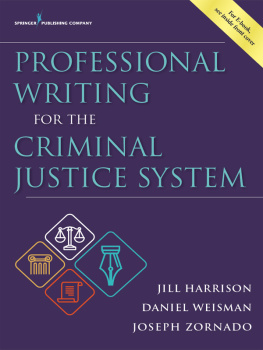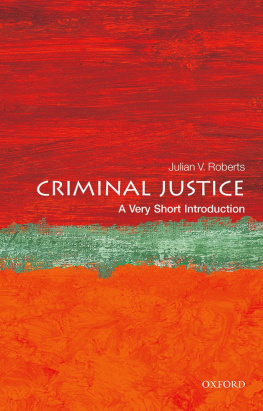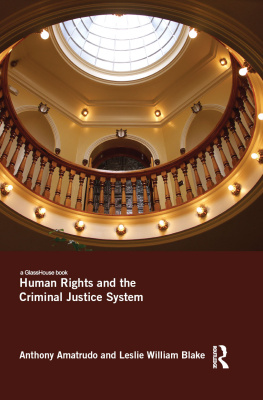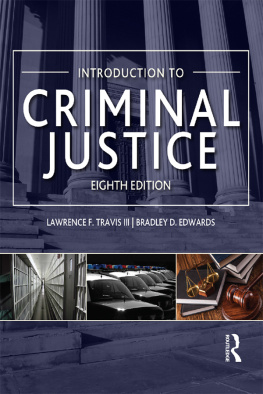Harrison Jill PhD - Professional Writing for the Criminal Justice System
Here you can read online Harrison Jill PhD - Professional Writing for the Criminal Justice System full text of the book (entire story) in english for free. Download pdf and epub, get meaning, cover and reviews about this ebook. year: 2017, publisher: Springer Publishing Company, genre: Home and family. Description of the work, (preface) as well as reviews are available. Best literature library LitArk.com created for fans of good reading and offers a wide selection of genres:
Romance novel
Science fiction
Adventure
Detective
Science
History
Home and family
Prose
Art
Politics
Computer
Non-fiction
Religion
Business
Children
Humor
Choose a favorite category and find really read worthwhile books. Enjoy immersion in the world of imagination, feel the emotions of the characters or learn something new for yourself, make an fascinating discovery.
- Book:Professional Writing for the Criminal Justice System
- Author:
- Publisher:Springer Publishing Company
- Genre:
- Year:2017
- Rating:5 / 5
- Favourites:Add to favourites
- Your mark:
- 100
- 1
- 2
- 3
- 4
- 5
Professional Writing for the Criminal Justice System: summary, description and annotation
We offer to read an annotation, description, summary or preface (depends on what the author of the book "Professional Writing for the Criminal Justice System" wrote himself). If you haven't found the necessary information about the book — write in the comments, we will try to find it.
Professional Writing for the Criminal Justice System — read online for free the complete book (whole text) full work
Below is the text of the book, divided by pages. System saving the place of the last page read, allows you to conveniently read the book "Professional Writing for the Criminal Justice System" online for free, without having to search again every time where you left off. Put a bookmark, and you can go to the page where you finished reading at any time.
Font size:
Interval:
Bookmark:
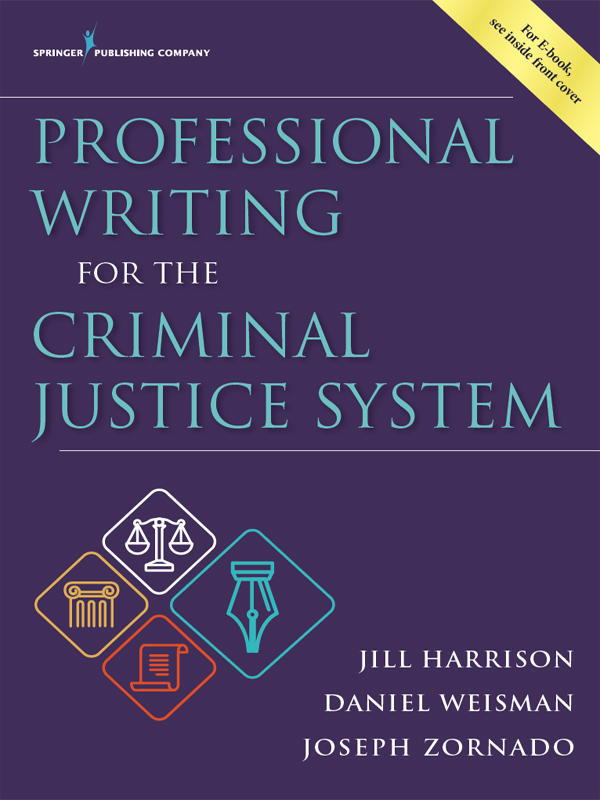
i Professional Writing for the
Criminal Justice System
ii Jill Harrison, PhD, is an associate professor of sociology, Rhode Island College, and the director of the Justice Studies Program, which offers BA and MA programs to over 400 students. She has worked within the Rhode Island prison system since 2006 and is a court-appointed special advocate for children in state care. She has excellent working relationships with a variety of state agencies, including the correctional staff and administration, and has served as a consultant, instructor, and researcher with the RI Department of Corrections. In addition, she has provided training in cross-cultural communication for medical and social work staff who work with special populations throughout New England. Her current research is focused on the relationship between childhood trauma, drug use, and adult incarceration.
Daniel Weisman, MSW, PhD, is Professor Emeritus of Social Work, Rhode Island College, and former chair, Bachelor of Social Work Department. He directed Rhode Island Colleges Applied Research and Training Project, and evaluated programs for several Rhode Island state departments, as well as private nonprofit agencies in numerous states. He was a certified site visitor for the Council on Social Work Education. He has coauthored three other books, including Professional Writing for Social Work Practice (2013); written chapters in several anthologies; and published articles in social work and labor studies journals.
Joseph Zornado, PhD, is a professor of English at Rhode Island College. He has written numerous articles and books on literature, culture, and film, as well as on the teaching of writing. His first scholarly monograph, Inventing the Child: Culture, Ideology, and the Story of Childhood, appeared in 2001 (Routledge). He recently completed a speculative trilogy, 2050: A Future History in three volumes (Merry Blacksmith Press, 2015). He has coauthored Professional Writing for Social Work Practice (Springer, 2013), and is currently completing a scholarly monograph, Disney and the Dialectic of Desire: Fantasy as Social Practice (Palgrave MacMillan, 2016). He teaches American literature, childrens literature, literary theory, literature and film, and speculative fiction, among other courses.
Criminal Justice System
Jill Harrison, PhD, Daniel Weisman, MSW, PhD,
and Joseph Zornado, PhD

Copyright 2017 Springer Publishing Company, LLC
All rights reserved.
No part of this publication may be reproduced, stored in a retrieval system, or transmitted in any form or by any means, electronic, mechanical, photocopying, recording, or otherwise, without the prior permission of Springer Publishing Company, LLC, or authorization through payment of the appropriate fees to the Copyright Clearance Center, Inc., 222 Rosewood Drive, Danvers, MA 01923, 978-750-8400, fax 978-646-8600, .
Springer Publishing Company, LLC
11 West 42nd Street
New York, NY 10036
www.springerpub.com
Acquisitions Editor: Stephanie Drew
Compositor: Newgen KnowledgeWorks
ISBN: 9780826194480
e-book ISBN: 9780826194497
17 18 19 20 21 / 5 4 3 2 1
The author and the publisher of this Work have made every effort to use sources believed to be reliable to provide information that is accurate and compatible with the standards generally accepted at the time of publication. The author and publisher shall not be liable for any special, consequential, or exemplary damages resulting, in whole or in part, from the readers use of, or reliance on, the information contained in this book. The publisher has no responsibility for the persistence or accuracy of URLs for external or third-party Internet websites referred to in this publication and does not guarantee that any content on such websites is, or will remain, accurate or appropriate.
Library of Congress Cataloging-in-Publication Data
Names: Harrison, Jill, 1963- author. | Weisman, Daniel, author. | Zornado, Joseph L., author.
Title: Professional writing for the criminal justice system / Jill Harrison, PhD, Daniel Weisman, PhD, and Joseph Zornado, PhD.
Description: New York, NY : Springer Publishing Company, [2017]
Identifiers: LCCN 2017002726 | ISBN 9780826194480 (paperback)
Subjects: LCSH: Criminal justice, Administration ofAuthorship. | CriminologyAuthorship.
Classification: LCC HV7419.5 .H37 2017 | DDC 808.06/6364dc23
LC record available at https://lccn.loc.gov/2017002726
Contact us to receive discount rates on bulk purchases.
We can also customize our books to meet your needs.
For more information please contact:
Printed in the United States of America by McNaughton & Gunn.
v This book is dedicated to our families, Cameron, Lori, Vivian,
Emily, Clara, Jack, Merith, Debbie, Ann, and Millard,
and to all our students who inspired this book.
vi vii Contents
Contents
viii ix Preface
Why do you need to learn to write more effectively? Do you, after all? What does writing have to do with criminal justice or any of the justice professions and practices that make it up, such as policing, or corrections, or courts? This book is an answer to this question, a set of answers really, with key ideas, plenty of examples, and lots of practice built in. Our work in the first three chapters begins with a review of some of the challenges that arise every day in justice-related work in terms of thought and perception. present a series of exercises designed to help you develop a simple but effective writing process. Without an effective writing process, writing becomes a stressful, often rushed chore that produces a product that is often inferior, unaccepted by a supervisor, or even inadmissible in court. But practice makes perfect. Our work will guide you through a full range of practice settings drawn from actual professionals currently working in the field of criminal justice. We conclude the book with a chapter on fundamentals of effective writing and a robust writing glossary that will help you to edit and correct your work in the final stage.
Imagine these scenarios:
You are a law enforcement officer. During a traffic stop, you smell a suspicious substance in the vehicle. You obtain verbal permission to search the vehicle and find what looks like a crack pipe and a small bag of an unknown substance tucked above the passengers visor. Once arrested, the suspect denies giving you permission to search the vehicle. Soon after this event you will have to produce a written report that, perhaps months later, you will use to prepare yourself for court and a defense attorneys cross-examination of what you say happened during that traffic stop.
You are a corrections officer in a prison. One evening you intervene in an altercation between two inmates. In order to break up the dispute, you use moderate force with one of the participants, which includes forcing an inmate down to the floor and cuffing him. Later, the inmate claims that you used unnecessary and undue force in a nonemergency situation. Your supervisor requests a written report of the event but it happened 2 weeks ago. What do you remember? Will your report be supported by the video that is in the wardens possession? Will your report describe what another officer on the scene witnessed?
Font size:
Interval:
Bookmark:
Similar books «Professional Writing for the Criminal Justice System»
Look at similar books to Professional Writing for the Criminal Justice System. We have selected literature similar in name and meaning in the hope of providing readers with more options to find new, interesting, not yet read works.
Discussion, reviews of the book Professional Writing for the Criminal Justice System and just readers' own opinions. Leave your comments, write what you think about the work, its meaning or the main characters. Specify what exactly you liked and what you didn't like, and why you think so.

